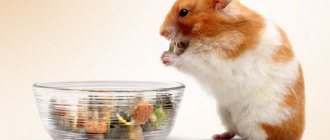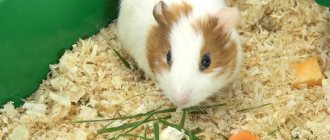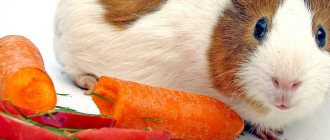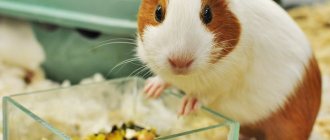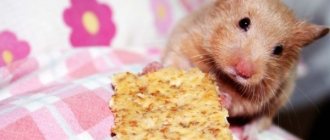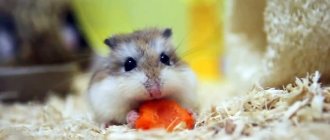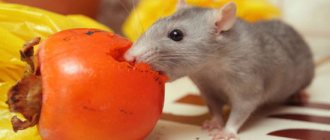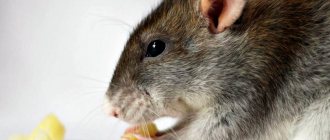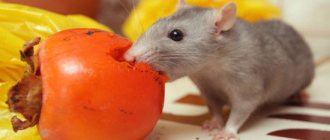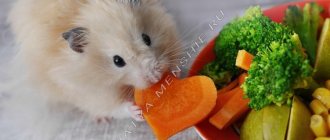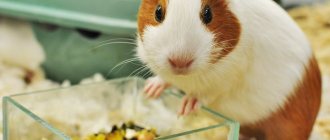The hamster's diet should be balanced. This means that his body should receive fats, proteins, carbohydrates, minerals and trace elements in equal parts. In nature, a rodent feeds on grain crops, berries, vegetables, and also, to replenish the body with protein, eats larvae, carrion, and small animals. At home, the basis of a hamster’s diet is a food mixture; berries, fruits, herbs, and vegetables are given as treats. But for the growth and health of a pet, protein is required, which is found in products such as low-fat cottage cheese and milk. It is also found in legumes, but plant protein, unlike animal protein, cannot fully saturate the body with the amino acids it needs. Can hamsters eat meat, since in terms of the amount of protein it contains, it exceeds all other products? What type of meat to give preference to and how often you can feed it to your pet - all this is discussed in this article.
What is protein for?
Protein affects the growth and development of internal organs, participates in metabolism, restores blood cells, and supports the proper functioning of the entire body. Contains essential amino acids for the body.
It is best to give your pet food containing protein in the morning, since this is a gloomy animal and is active at night. In the morning he prepares for a daytime nap, which means he needs to be given light food for breakfast. Protein is quickly absorbed by the body, while saturating it.
Hamsters eat meat products with great pleasure, so be sure to include meat in your pet’s diet. But don't overdo it. It is enough to give it to your rodent a maximum of once or twice a week, but not less than once a month.
Can hamsters have sausage and frankfurters?
The hamster's body is very sensitive to food, regardless of the type of animal. The Djungarian hamster and the Syrian hamster are the most common types of domestic rodents. They differ from each other in size, but their diet is the same, which means the Syrian can suffer in the same way from harmful food as the Djungarian.
Sausages and frankfurters are processed meats. This product contains a huge amount of fat, spices, salt, not to mention preservatives, dyes and so on.
A rodent’s stomach simply cannot process such a composition. Therefore, it is impossible to give sausage to hamsters, and even strictly prohibited, since the pet may not refuse such a treat, but the consequences for its health will be more than terrible.
Which meat do you prefer?
Not every type of meat is suitable for feeding an animal. The following are considered permitted:
- Beef liver. In addition to protein, it contains sodium, calcium, iron, phosphorus. The vitamin A it contains improves the condition of the rodent's fur, making it smooth and shiny. It is considered a dietary product. If your pet is overweight, beef liver will be beneficial for him in all respects.
- Beef heart. It is very useful for a hamster to eat after suffering from infectious diseases to restore strength and improve blood composition. Like liver, it is considered a low-calorie product.
- Chicken meat, preferably breast. White chicken meat is considered healthier, unlike red. It does not contain fats, cholesterol, or difficult-to-digest substances that negatively affect intestinal function.
- Lean beef. This includes the shoulder and tenderloin. Beef is good for a hamster, as it has a low calorie composition and a large amount of vitamins and microelements. Strengthens the immune system, restores strength, and prevents vitamin deficiency.
These products cannot be given to the hamster in their raw form. It is important that they are boiled in water without adding salt and spices. He will also benefit from low-fat meat broth with the addition of herbs - parsley or dill. You should only give your hamster fresh cooked meat to avoid causing stomach upset.
Hamster nutrition: do's and don'ts
It would seem that the answer to the question “What to feed a hamster?” very simple. However, in practice, feeding hamsters can raise many questions among inexperienced owners regarding whether this or that product can be given to their pet.
Hamsters must have a balanced diet
. This means that it will include not only ready-made dry food, which forms the basis of the diet, but also other products. In particular, you can give your hamster the following foods.
Cereals, nuts and seeds
. From cereals you can give wheat, oats, barley, buckwheat, rolled oats, lentils. They are given in dry form; Porridges cooked in water without salt or seasonings are fed to sick and weak animals. Nuts you can give are peanuts, hazelnuts, cashews, and walnuts. You can also give your hamster melon, pumpkin, sunflower and sesame seeds.
Vegetables, fruits and berries
. Hamsters' diet must include fresh fruits, berries and vegetables - a source of vitamins and moisture. Among the berries you can give currants, gooseberries, strawberries, pitted cherries, and blueberries. From fruits - apple, pear, apricot, melon, peach, banana, grapes, plum (in small quantities). Hamsters also enjoy eating dried fruits - dried apples and pears, raisins, dried apricots, banana chips.
Most vegetables are given to your hamster raw.
. You can treat your pet to pumpkin, carrots, bell peppers, tomatoes, cucumbers, radishes, radishes, zucchini, zucchini, beets, squash, turnips, green beans, fresh corn, Chinese cabbage, broccoli, fresh peas, young peas in pods. Occasionally and in small quantities, you can give cauliflower, peeled rose hips and celery. Some vegetables (pumpkin, carrots, beets and peas) can also be given boiled; they are cooked for a short time and without salt.
Greens, leaves and sprouts
. Hamsters' food may also include oat, wheat, bamboo and alfalfa sprouts. From greens you can give salad, dill, parsley, plantain leaves, dandelion leaves, nettles, clover. Hamsters also eat leaves of fruit trees (apple, cherry, pear), as well as other deciduous tree varieties (ash, beech, maple, willow, poplar, oak, birch, walnut).
All vegetables, fruits and berries that you give your hamster must be fresh, not overripe or spoiled
. Plants for a hamster should be collected away from roads and industrial enterprises. Any plant food should be washed thoroughly before giving it to your hamster.
Hamsters' diet also includes a protein component.
. This can be boiled chicken or low-fat boiled fish without seasoning and salt, low-fat fermented milk products (yogurt without additives and sugar, cottage cheese, kefir, all with a fat content of no more than 1%), boiled chicken or quail egg. Less often they give live food: butterflies, grasshoppers, mealworms, earthworms, dried gammarus. Any live food must be purchased at a pet store! Protein products are given to the hamster 2-3 times a week (of course, not all at once, but just one).
There are a number of foods that are not recommended to be included in a hamster's diet.
. They cannot be called strictly prohibited, but there is a high risk that they will cause irreparable damage to the health of your pet. These include cheese (especially fatty and salty varieties), acorns, Brazil nuts, persimmons, white bread, potatoes, as well as ready-made food for other rodents and birds.
Finally, there are foods that should absolutely not be given to hamsters.
. These include:
- salt, spices, sugar, both in pure form and as part of other products;
- fried, fatty, smoked food, any food from your table;
- exotic fruits (including pineapples, kiwi, avocado, pomegranate, citrus fruits), watermelon;
- fruit juices;
- leeks, garlic, mint, cabbage (white and red), sorrel;
- branches of coniferous trees, tulip, all plants and herbs collected within the city;
- cream, sour cream, milk, butter;
- muesli, breakfast cereals, kozinaki;
- almonds, apricot and cherry pits (contain hydrocyanic acid, which is lethal to hamsters);
- peel and eyes of raw potatoes;
- sausages, sausage, fatty meat;
- dry pasta;
- mushrooms;
- honey;
- black bread;
- bloodworms and wild-caught insects;
- chocolate, ice cream, cookies and any other sweets.
Proper nutrition for hamsters is one of the guarantees of their health. At the same time, it is very important to know which foods you can give your hamster and which you absolutely cannot.
Related publications:
When meat is vital
Young hamsters and pregnant and lactating females need twice as much protein as an adult or elderly rodent. Protein promotes the formation of new cells, growth and development of the body. Be sure to give meat to young animals for breakfast.
Pay special attention to the diet of a pregnant female. Lean meat should be included in her diet once or twice a week on an ongoing basis, just on different days. Protein prevents the formation of toxins in a pregnant woman’s body, making her resistant to stress and various types of infections. Thanks to protein, the correct intrauterine development of future cubs occurs. Nursing females need it to maintain their own strength and for the intensive growth of babies. Protein does not accumulate in the body; it must be constantly replenished with meat and other products.
What foods should not be given to hamsters?
Spices: pepper, salt, cinnamon, vinegar - everything that we use as a food additive. That is why it is extremely undesirable to feed a hamster from a human table.
Fatty foods (sausages, fatty meats, cheeses, milk, lard, butter, heavy cream and sour cream), sweet foods (honey, sugar, jam, sweets), salty foods (canned vegetables, salted fish, etc.) are harmful to a hamster. , flour (bread, especially white, buns, cakes, pastries), spicy (dishes with pepper).
Fruit seeds are harmful and may even be toxic: peach, apricot, plum, cherry seeds. You should not give hamsters spruce, pine cones, or nuts in shells. With sharp edges, hamsters can damage their cheek pouches, and fruit tree seeds can cause poisoning.
It is not advisable to give your hamster spikelets with grains: the sharp edges of the spikelet can also prick the cheek pouches.
Prohibited meat products
Prohibited meat products include:
- Fatty meats (pork, lamb). These types of meat contain fat, mucus, histamines, substances that are not processed by the intestines and remain there to rot. All this becomes the cause of various types of infections and skin diseases (allergies, dermatitis). Eating pork is fraught with the development of arthritis and arthrosis in rodents.
- Sausages are a complex chemical product containing vegetable fats, stabilizers, nitrates, and flavor enhancers. This composition negatively affects the body of a small animal and shortens its life by half.
- Any raw meat. Leads to the development of helminthic infestations and various types of infections. It is poorly absorbed and causes diseases of the gastrointestinal tract.
- Grilled meat. It is considered a high-calorie food due to its high fat content. With its regular use, the concentration of fat in the pet’s body will reach such proportions that it will not be able to cope with it. This will lead not only to obesity, but also to heart, liver, and vascular disease. In addition, after frying, the meat loses all the vitamins and amino acids it contains.
- Dried meat. Not suitable for feeding a hamster due to its high salt content. Salt corrodes the walls of the stomach and negatively affects the liver and kidneys.
- Smoked meat. It is dangerous because the liquid smoke used in its preparation contributes to the development of gastritis and ulcers.
The myth about feeding hamsters meat
A common misconception is that eating meat turns hamsters into cannibals. People sometimes mistakenly believe that feeding hamsters meat gives them a taste for meat and increases the risk of them eating their babies or each other. There are situations where hamsters eat their babies, but this is usually because the baby is unwell or because they do not have access to food or water. Sometimes hamsters will eat each other if they are starving, but this is very rare and has absolutely nothing to do with whether they eat meat or not.
Let's sum it up
Finding the right food for a hamster at home is not difficult; you just need to follow the basic rules: natural food should always be fresh and served in reasonable quantities. Products containing protein must be included in the diet daily in small quantities, alternating them with each other: cottage cheese, milk, fish, meat, eggs.
So, can hamsters eat meat? Be sure to feed it to your pet. Moderate consumption of this product will improve the condition of the coat, prevent vitamin deficiency, and have a positive effect on the general condition of the animal’s body.
Nutritional value of meat
The nutritional value of meat varies greatly. Therefore, below is a breakdown of the meats you are most likely to feed your hamster.
Nutritional value of mealworms in percentage:
- Proteins - 53%
- Fats-13%
- Fiber - 2%
- Water - 62%
Nutritional value of crickets in percentage:
- Proteins - 21%
- Fats - 6%
- Fiber-3.2%
- Water - 69%
Nutritional value of 100 g of boiled chicken breast without bones and skin:
- Calorie content - 165 kcal
- Proteins - 31 g
- Fat - 3.6 g
Nutritional value of 100 g of boiled beef:
- Calorie content - 251 kcal
- Fat – 19 g
- Proteins - 18 g
- Vitamins and minerals - vitamins B6, B12 and D, iron, magnesium and potassium.
The main benefit of including meat in a hamster's diet is that it provides them with protein, which is lacking in many other treats you can give your hamster.
What should you not give?
Animals will eat almost everything you offer them; they do not know the dangers of many foods for their stomachs. But the owner should know exactly which products are prohibited, and accordingly protect his pet from them:
- Any sausage products.
- Milk and dairy products.
- Fatty meat, lard.
- Mushrooms.
- Onion garlic.
- Honey.
- Sweets, chocolate, cookies.
- Berry seeds.
- Canned food.
- Fresh bakery.
- Pasta.
- Salt, sugar, spices.
- Various fats.
- Exotic fruits.
- Fried, fatty, spicy food.
An incorrect diet will contribute to the development of obesity, allergic reactions and digestive problems. In advanced cases, the animal simply dies.
Providing your hamster with proper nutrition is not difficult at all. The main thing is to exclude prohibited foods from his diet and make the food as varied as possible. Good nutrition will give your pet excellent health and enable it to live as long as possible.
The need for heat treatment
Before feeding hamsters with proteins and yolks, it is recommended to carry out heat treatment. Raw eggs may contain substances, bacteria, and viruses that are dangerous to the animal. For example, salmonella is the causative agent of a serious disease. Heat treatment can be neglected only if you are completely sure that there are no diseases in the bird. Eggs purchased in stores must be processed.
What to feed an adult hamster?
An adult Syrian rodent is extremely susceptible to vitamin deficiency, so its diet should be as varied as possible. Every day you need to treat your pet with fresh fruits and berries. You need to choose the juiciest leafy greens, since the hamster will not eat dried out, limp ones, but will use them to build a nest. In order for the animal to sharpen its teeth, it is recommended to periodically give it pasta or crackers. Rotten, spoiled food should be immediately removed from the feeder before it poisons the animal. There should always be fresh and clean water in the drinking bowl. An adult hamster drinks little, but there is no need to worry about this: the pet receives a large percentage of the liquid from vegetation. Hamsters usually do not suffer from digestive disorders. If the owner notices diarrhea or constipation in the animal, then it is enough to give it vegetable oil or boil broken rice.
Conclusion
Hamsters can eat meat, but you should adhere to some of the rules described above. Products must be fresh and free of chemicals, including antibiotics. Chicken, like heart and liver, must be boiled before use. Only in this case the animal will benefit, and not cause gastrointestinal upset.
Did you like the article? Share with friends: [supsystic-social-sharing id=”1"]
- Related Posts
- Can hamsters have raisins?
- Can hamsters eat pumpkin?
- Can hamsters eat corn?
« Previous entry
Can hamsters eat chicken?
Chicken fillet is even necessary in feeding a hamster, as it contains various microelements (phosphorus, iron, potassium), vitamins of various groups. The healthiest part of chicken is a good diet breast. Chicken meat will only benefit the animal.
Protein is necessary for growth, maintaining the tone of internal organs, affects the regeneration of blood cells and is aimed at the correct functioning of the body as a whole.
Chicken should be given in the morning, as protein is a quickly digestible element. Considering that hamsters are active at night, such light food is perfect for him during daytime sleep.
Precautions when feeding your hamster fish
So now you know that your hamster can safely eat fish. This is great, but there are a few precautions to keep in mind before you begin the feeding process.
When feeding your hamster fish, there are 4 basic precautions to take:
- Be sure to cook the fish properly to remove harmful parasites and bacteria.
- Don't season your fish - seasonings like salt, pepper, garlic and lemon are not good for your hamster - plain fish is the best option.
- Be sure to remove the fish bones. If you don't, they can become a choking hazard.
- Don't overfeed. Fish should be an occasional treat and not a replacement for the regular diet. Especially if you have a dwarf or robo hamster, make sure you feed it small amounts.
What meat should not be included in a hamster's diet?
Another question that worries the owners of the animal is whether it is possible to give the hamster raw meat - after all, in the wild, rodents eat meat in its raw form.
However, you should not feed your pet:
- raw meat,
- sausages,
- sausages,
- fatty meat (lamb, pork).
Beef fiber is difficult for a hamster to digest. And pork can lead to more serious digestive upset.
It is strictly forbidden to give meat with spices, fried, dry-cured and any kind of smoked meat.
You should not add cutlets to the diet, as they undergo long-term heat treatment, which is not beneficial for the rodent.
